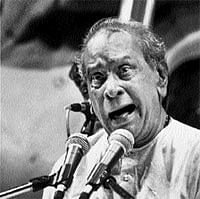
One of the illustrious disciples of the famed, Kirana Gharana, hallowed by such great luminaries like its styliser Abdul Karim Khan and his own legendary mentor Rambhau Kundagolkar, better known as Sawai Gandharva, Bhimsen by his stentorian vocalism lent a new dimension to the gharana.
In his eclectic style of rendition, one could discern the unique picturesque ‘bol-taans’ known to the Gwalior gharana, the emphatic rhythmic grandeur of the Agra gharana, the full-throated spectacular, sculpted imagery of the Jaipur gharana and the cultivated pristine texture of his own parental Kirana gharana.
Indeed his chiselled style was an amalgamation of the very best in the tradition of Hindustani classical music, nay music in its fullness, a musical inheritance that goes back to the all-time greats like a Thansen, a Tyagaraja or a Beethoven.
That is what made Bhimsen one of the most popular Hindustani vocalists of his generation. He was a genius who could not only transcend all theoretical boundaries of a technique, but verily transport any category of listener to a sublime realm. No wonder, he had among his fans as many votaries of Hindustani style as its Carnatic counterpart.
His gifted voice could exfoliate the contrasting emotions of anguish and ecstasy with equal felicity; his impassioned rendition of both the major melodies like a Thodi or Kalyan in their multifarious variations and their minor counterparts like Bhoop or Abhogi with equal aplomb. In either case, one could only marvel at his unfailing deep, powerful and penetrating vocalism. Equally emphatic was the way he could throw away the values and sanctity of sweetness to unleash a flurry of rollicking bol-taans, an exquisite feat which was not easily fathomable by any other artiste in living memory.
The effortless ease with which his tried vocal chords alternately contrasted the vibrant and tender shades is another special characteristics of Bhimsen’s rendition, capable of capturing the subtlest tones, at once showcasing the aesthetic majesty and grandeur of his exceptionally captivating quality of singing.
What is more, Bhimsen was as much at home in encapsulating the classical mode as in toying with the lighter variety of music. While his alap, bhadat and bandish in the classical mode sported a proportioned, balanced and serene majesty of the melodic range, the lighter Bhava Geet, Thumri, Abhang and Dasapadas were redolent with discreet lyrical flavour.
In either case, what captured the heart and soul of the discerning listener was his uncanny craftiness and skill, the unfailing imaginative flights, rhythmic continuity and singular charm, making their lasting impact.
Versatile singer
It is befitting to recall here that though a Kannadiga by birth who had chosen to spend his later years in Pune, the musical buff in Bangalore, however came to recognise his versatility not from his voluminous and rich, organ-like tonal flourishes that ornamented a classical raga, but the picturesque, lyrical outpourings that showcased as impactfully a devotional like ‘Yadava nee baa’ of Saint Purandara Dasa, as the poetic masterpieces of Kuvempu as in his ‘Jalagara neeniru doora’ or Bendre’s ‘Naanu veene neenu thanthi.’
Likewise his bhajans like ‘Hari bhajane maado’ ‘Deva vittala, swami vittala’ made an avid listener go mad with frenzy. His airing of the ubiquitous ‘Bhagyadalakshmi baaramma’ which became a film hit, is a ditty that turned out to be the mainstream of the film ‘Nodi Swami Navirode Heege,’ snatching focus away from such ever-green heroes like the Nag brothers — Anant and Shankar.
Though Bhimsen had a good many number of fans in Bangalore, he always nourished a grouse that he never got his due from his own people or the state government. An incident that happened way back in the early 1960s will stand testimony to his disparagement.
It was a concert organised by the newly formed South Kanara Music Association. For its inaugural fare, it had featured Bhimsen Joshi; the chief guest for the evening being the late Vaikunta Baliga, Speaker of the state Assembly. During the interval, Baliga made his inaugural speech which among others showered lavish praise on the state’s endeavour to promote music and other fine arts.
Bhimsen who listened to the speaker’s peroration with attention could not bear it any longer. He sprang up and retaliated: “The speaker has boasted no end to the patronage extended by the state to fine arts. Look here, in this hall which can accommodate more than 800, I see hardly 200 listeners. I may only remind him that if it was Calcutta or Jalandhar or even Karachi, tickets would have been sold in black market. There is no need for further comment.”
Yet, that is not one of the reasons for his moving over to Pune.
True, Bhimsen during his long 88 years’ journey did not find time to nourish his inheritance to continue a tradition. His son Srinivas Joshi is yet evolving. But our own Vinayak Torvi has, to an extent, succeeded in imbibing some of the maestro’s innovative moorings. There, perhaps is some hope.
Overall, Panditji’s passing away, albeit after a full life, is verily an irreparable loss. Alas! A robust, natural musical genius is no more. But the captivating lilt of his chiselled style and his incredible mastery of intoning, will linger long, nay endure forever.
(The writer is a veteran music critic)